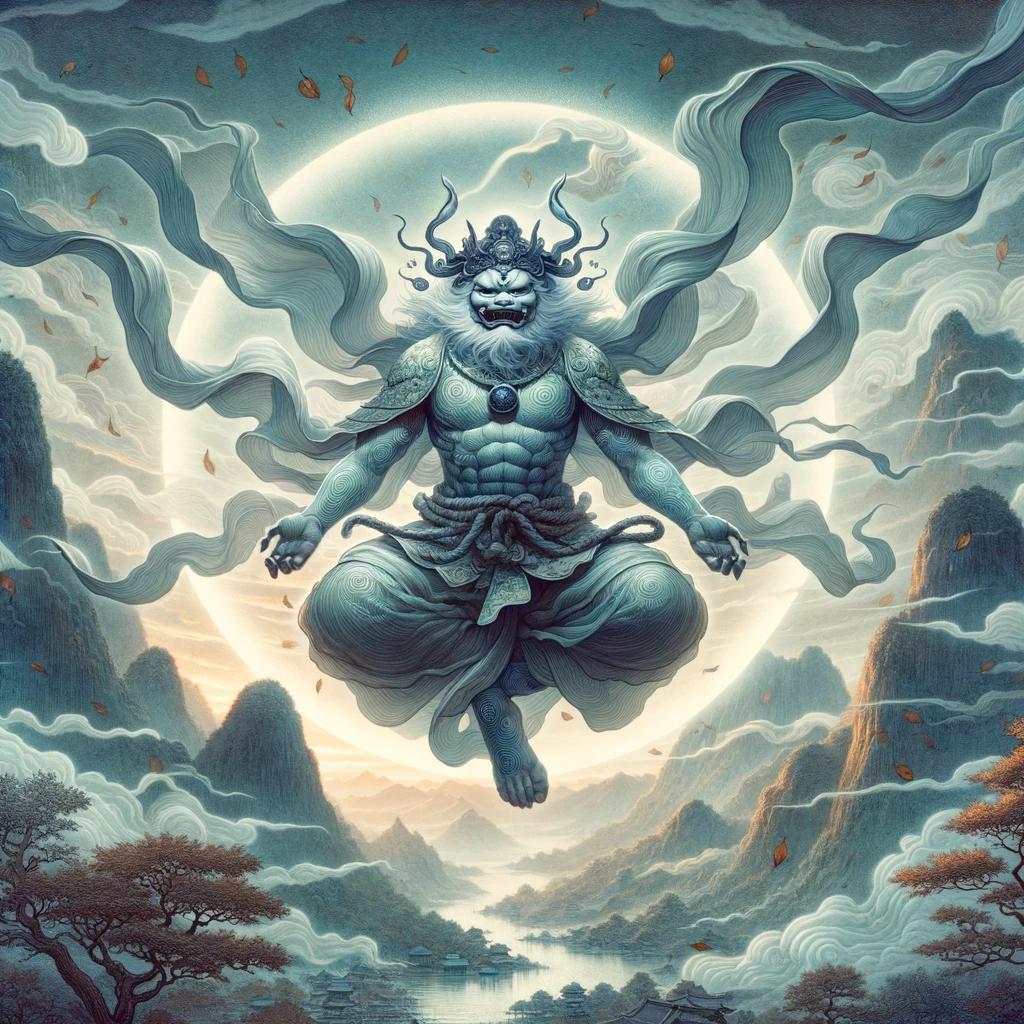The Japanese Legend of Tengu is a fascinating topic that has been passed down through generations. Tengu are legendary creatures from Japanese folklore that are known for their bird-like appearance and supernatural abilities. They are often depicted as mischievous tricksters who enjoy playing pranks on humans.

According to legend, Tengu are said to live in the mountains and forests of Japan. They are believed to be powerful beings with the ability to control the elements and shape-shift into different forms. Some stories suggest that Tengu are protectors of the natural world and can be called upon for guidance and assistance.
Despite their reputation as tricksters, Tengu are also revered in Japanese culture for their wisdom and martial arts skills. They are often depicted in traditional Japanese art and literature, and their legend continues to captivate people around the world. The Japanese Legend of Tengu is a fascinating topic that offers insight into the rich cultural heritage of Japan.
Origins of Tengu
Tengu, the legendary creatures of Japanese folklore, are known for their mischievous and sometimes malevolent nature. They are often depicted as bird-like creatures with human-like features, such as a long nose and wings. The origins of Tengu can be traced back to both historical and mythological roots.
Historical Context
The first recorded mention of Tengu can be found in historical documents from the Heian period (794-1185). During this time, Tengu were described as mountain spirits who lived in the forests and mountains of Japan. They were believed to be able to control the weather and were often associated with natural disasters such as thunderstorms and earthquakes.
Tengu were also associated with the practice of martial arts, particularly swordsmanship. They were said to be skilled fighters who could teach humans the art of combat. This association with martial arts led to the creation of the Tengu-do, a style of swordsmanship that is still practiced in Japan today.
Mythological Roots
In addition to their historical context, Tengu also have mythological roots. According to legend, Tengu were once human beings who had achieved supernatural powers through years of intense training and meditation. These individuals were said to have gained the ability to fly and control the elements, among other powers.

Over time, these individuals were transformed into the bird-like creatures that we know as Tengu. They continued to live in the mountains and forests of Japan, where they became known for their trickery and mischief.
In conclusion, the origins of Tengu can be traced back to both historical and mythological roots. These legendary creatures have played an important role in Japanese folklore for centuries and continue to fascinate people around the world today.
Characteristics of Tengu
Tengu is a legendary creature from Japanese folklore. It is often depicted as a bird-like being with a human-like face. Tengu is known for its mischievous and sometimes malevolent behavior. In this section, we will discuss the physical features and powers and abilities of Tengu.
Physical Features
Tengu is usually depicted as a bird-like creature with a red face and a long nose. In some depictions, it has wings and talons, while in others, it has human-like arms and legs. Tengu is often portrayed wearing a traditional Japanese outfit and carrying a fan. Its appearance varies depending on the region and time period.

Powers and Abilities
Tengu is known for its supernatural powers and abilities. It is said to have the power of flight, shape-shifting, and telekinesis. Tengu is also known for its swordsmanship and martial arts skills. It is said to be able to control the wind and create illusions. Tengu is often depicted as a powerful and cunning creature that can outsmart its opponents.
In conclusion, Tengu is a legendary creature from Japanese folklore known for its mischievous behavior and supernatural powers. Its physical features and abilities vary depending on the region and time period. Despite its malevolent reputation, Tengu is often revered in Japanese culture as a symbol of wisdom and strength.
Tengu in Folklore
Tengu are supernatural creatures that are prominent in Japanese folklore. They are often depicted as bird-like creatures with human-like features, such as a long nose and a beard. Tengu are known for their mischievous and sometimes malevolent behavior, but they are also revered as protectors of the mountains and forests.
Notable Stories
One of the most famous stories involving Tengu is the tale of the warrior Minamoto no Yoshitsune. According to legend, Yoshitsune was trained in swordsmanship by a Tengu named Sōjōbō. Sōjōbō taught Yoshitsune the art of the sword and other martial arts, which helped him become a formidable warrior.
Another well-known story involving Tengu is the legend of the Yamabushi monks. According to this story, the Yamabushi monks were able to communicate with Tengu and learn from them. The Tengu taught the monks various skills, including martial arts and magic.
Moral Lessons
Tengu stories often have moral lessons embedded in them. For example, the story of Minamoto no Yoshitsune and Sōjōbō teaches the importance of humility and respect for one’s teachers. The story of the Yamabushi monks and the Tengu teaches the value of learning from others and being open to new experiences.
Overall, Tengu are fascinating creatures that have played an important role in Japanese folklore for centuries. Their mischievous behavior and supernatural abilities have captured the imagination of generations of people, and their stories continue to be told to this day.
Cultural Significance
Religious Aspects
The Tengu, a supernatural creature from Japanese folklore, has played a significant role in the country’s religion and mythology for centuries. In Shintoism, the Tengu is considered a kami, or a god, associated with mountains and forests. They were believed to be the protectors of these natural spaces and were often depicted as bird-like creatures with long noses and wings.
In Buddhism, the Tengu is often portrayed as a mischievous and malevolent being, tempting monks and disrupting their meditation. However, they are also seen as protectors of the Dharma, or Buddhist teachings, and are said to have the ability to transform into human form to help those in need.
Modern Depictions
In modern times, the Tengu has become a popular figure in Japanese popular culture, appearing in manga, anime, and video games. They are often depicted as powerful warriors or magical creatures, with their long noses and wings being iconic features.
The Tengu has also become a symbol of Japanese nationalism and pride, with some groups using the creature as a mascot or symbol of their organization. However, some have criticized this use as cultural appropriation and disrespect for the Tengu’s religious significance.
Overall, the Tengu remains an important figure in Japanese folklore and mythology, with its cultural significance continuing to evolve and adapt with the times.
Regional Variations
Yamabushi Tengu
In the Yamabushi tradition of Shugendo, Tengu are considered to be divine protectors of the mountains. They are often depicted as red-faced, long-nosed creatures with wings and talons. In this tradition, Tengu are seen as wise and knowledgeable beings who can impart spiritual teachings to those who seek them out. Yamabushi Tengu are said to possess supernatural powers, such as the ability to control the weather and to shape-shift into various forms.
Karura
In some regions of Japan, Tengu are known as Karura. Karura are depicted as bird-like creatures with human faces and feathered bodies. They are often associated with the Buddhist deity Garuda and are considered to be protectors of the Dharma. In this tradition, Karura are seen as fierce and powerful beings who can bring about destruction to those who oppose the teachings of Buddhism.
Overall, the regional variations in the depiction of Tengu highlight the diversity of beliefs and traditions in Japan. While some see Tengu as wise and benevolent beings, others view them as fierce and powerful protectors. Regardless of their specific characteristics, Tengu remain an important part of Japanese folklore and continue to captivate the imagination of people around the world.
Tengu in Popular Culture
Literature
Tengu, the legendary creatures from Japanese folklore, have been a popular subject in literature for centuries. One of the most famous examples is the 14th-century epic “The Tale of the Heike,” which features a Tengu as a key character. In modern literature, Tengu have appeared in various forms, from horror stories to fantasy novels. Some notable works include “Tengu: The Mountain Goblin” by Graham Masterton and “Tengu: The Shamanic and Esoteric Origins of the Japanese Martial Arts” by Peter A. Boyles.
Film and Television
Tengu have also made their way onto the big and small screens. In Japanese cinema, Tengu have been featured in movies such as “Tengu Priest” and “Tengu: The Masked Monarch.” In Western cinema, Tengu have appeared in films like “The Wolverine” and “47 Ronin.” Tengu have also been featured in various television shows, including the popular anime “Naruto.”
Anime and Manga
Tengu have been a popular subject in Japanese anime and manga for many years. One of the most famous examples is the anime series “Mononoke,” which features a Tengu as the main antagonist. Other notable examples include “Nurarihyon no Mago,” “Karas,” and “Gintama.” In manga, Tengu have appeared in works such as “Naruto,” “InuYasha,” and “Bleach.”
Overall, Tengu have had a significant impact on popular culture, appearing in various forms of media and captivating audiences with their unique appearance and fascinating mythology.
Frequently Asked Questions
What is the significance of Tengu in Japanese folklore?
Tengu are a type of supernatural creature in Japanese folklore that are often depicted as bird-like humanoids with long noses. They are considered to be powerful and mischievous beings, and are often associated with mountains and forests. Tengu have been a part of Japanese folklore for centuries, and their significance has evolved over time.
How do Tengu powers manifest in legends?
Tengu are known for their supernatural abilities, such as shape-shifting, telekinesis, and the ability to control the weather. In legends, they often use these powers to play tricks on humans or to test the skills of warriors and monks. Tengu are also said to be skilled in martial arts and are sometimes depicted as fierce warriors.
What are the differences between Crow Tengu and Dai Tengu?
There are two main types of Tengu in Japanese folklore: Crow Tengu and Dai Tengu. Crow Tengu are smaller and more mischievous, while Dai Tengu are larger and more powerful. Dai Tengu are often depicted as leaders of the Tengu and are associated with wisdom and knowledge.
What roles do Tengu play in the dynamic between good and evil?
Tengu are often portrayed as tricksters and troublemakers, but they are not necessarily evil. In some legends, they are seen as protectors of the mountains and forests, and are respected by humans who live in those areas. Tengu are also sometimes associated with Buddhism, and are said to have the power to protect the Dharma.
How is the Tengu mask used in Japanese culture, and what does it symbolize?
The Tengu mask is a popular symbol in Japanese culture, and is often used in festivals and theatrical performances. The mask is typically red and has a long nose and sharp teeth. It is meant to represent the mischievous and powerful nature of the Tengu. The mask is also sometimes used in martial arts, where it is believed to bring good luck and protect the wearer.
Can Tengu be considered deities, and what are their divine aspects?
While Tengu are not considered deities in the same way that gods and goddesses are, they are sometimes seen as divine beings. In some legends, they are said to have the power to control the elements and to bring good fortune to those who honor them. Tengu are also associated with Buddhism, and are sometimes seen as protectors of the Dharma.





